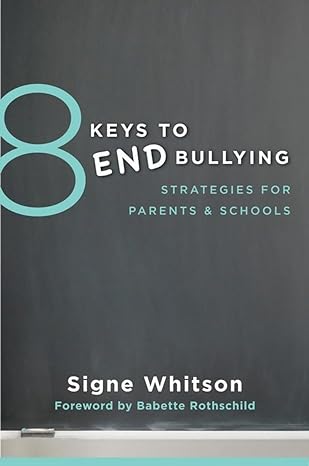July 31, 2014

8 Keys to End Bullying Strategies for Parents & Schools
By Signe Whitson
W.W. Norton & Company (2014)
For parents and school personnel, dealing with acts of bullying can be a rocky road. Signe Whitson’s book 8 Keys to End Bullying is a helpful guide on how to handle these types of situations. In her book, Whitson carefully breaks down bullying into eight parts.
She starts off by defining bullying, which can be mistaken for rudeness, or brushed off as something minor, by adults. Bullying is something that adults should not simply overlook. It is best for the child’s well-being if adults intervene and stop bullying.
Although I am neither a parent nor a teacher, I am the eldest of five. From a young age both of my sisters experienced bullying. My youngest brother is a special needs child entering kindergarten and I worry that he may be bullied as well. Whitson lists children who are likely to be bullied, children with disabilities being among them. This list helps raise awareness of children vulnerable to bullying, alerting parents to keep an eye out for them.
Children today spend several hours a day with technology. For many young people technology has become an essential part of life. Being constantly connected makes cyberbullying even more possible. 8 Keys to End Bullying focuses on ways parents can keep up with children’s technology use and how to get children to be open about it.
While many children spend hours plugged in to their various electronics, Whitson suggests that children should spend more time face-to-face. With the right guidance, more social interaction enables children to develop social and emotional skills, and Whitson discusses programs and resources that can help develop these skills. These programs teach youth emotion management, empathy, problem solving, assertiveness, and friendship-building.
Instead of punishing and humiliating children who bully, teaching these skills can help prevent bullying in the first place and help raise empathy levels. These social and emotional programs can also help reduce bullying bystanders. Some children don’t know how to intervene when they witness an incident of bullying. Whitson points out that being assertive is key to stopping bullying.
Whitson makes it clear that from school polices, to house values, to a relationship with a child, adults can have a great influence on bullying prevention. Also through engaging activities and assertiveness, children themselves can make a difference in the campaign to end bullying.
Submit To The NAMI Blog
We’re always accepting submissions to the NAMI Blog! We feature the latest research, stories of recovery, ways to end stigma and strategies for living well with mental illness. Most importantly: We feature your voices.
LEARN MORE